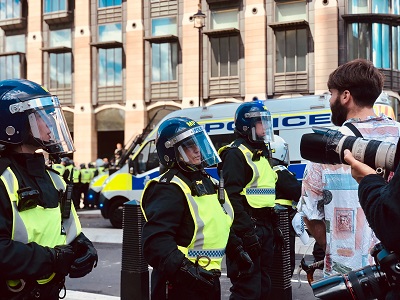PHILADELPHIA (December 5) – The American Civil Liberties Union of Pennsylvania announced today that it has settled two lawsuits against the city of Philadelphia after police unlawfully retaliated against people who recorded them carrying out their duties. The litigation stemmed from two separate incidents in 2012 and 2013 but were argued together in federal court, leading to a landmark ruling in July from the Court of Appeals for the Third Circuit that there is a First Amendment right to record the police in public.
The cases were part of a series of five lawsuits brought against the city by the ACLU of Pennsylvania on behalf of people who were arrested, cited, or physically restrained by Philadelphia police for photographing or video recording them at work.
“The best tool for police accountability available today is the smartphone in someone’s pocket,” said Molly Tack-Hooper, staff attorney at the ACLU of Pennsylvania. “We’re grateful to our clients for enduring years of litigation to protect this vital First Amendment freedom.”
The city agreed to resolve the cases brought by Amanda Geraci and Rick Fields, the plaintiffs in the cases, for a combined settlement of $250,000, including attorneys’ fees. In 2012, Geraci was serving as a legal observer when she was violently restrained across the throat by a Philadelphia police officer after attempting to photograph the arrest of a protester at the Pennsylvania Convention Center. In 2013, Fields was arrested and detained in a police van because he photographed police officers breaking up a party near Temple University. Fields’ phone was confiscated and damaged, and he was charged with obstruction of a highway, a charge that was later dropped.
Although the plaintiffs’ claims were initially dismissed at the federal district court, the appeals court ruled in their favor in July. In its ruling, the court acknowledged a “growing consensus” among appeals courts around the country that the First Amendment protects people’s right to record the police.
“We hope that these cases will serve as a warning to any other police force that retaliates against people who record officers as they carry out their duties,” said Reggie Shuford, executive director of the ACLU of Pennsylvania. “There are consequences for violating people’s constitutional rights.”
Fields and Geraci are represented by Molly Tack-Hooper and Mary Catherine Roper of the ACLU of Pennsylvania; John Grogan and Peter Leckman of Langer, Grogan & Diver, P.C.; Jonathan Feinberg of Kairys, Rudovsky, Messing, Feinberg & Lin LLP; and Seth Kreimer of the University of Pennsylvania Law School.
More information about these cases, including photos from both incidents, is available at www.aclupa.org/geraci and www.aclupa.org/fields.

